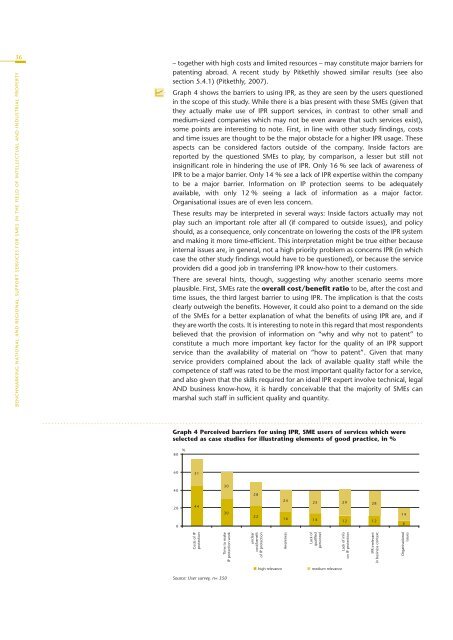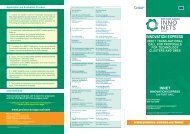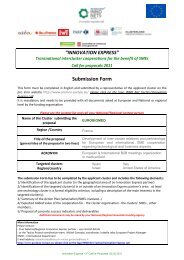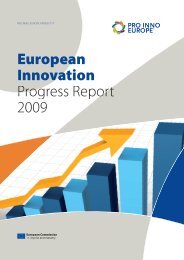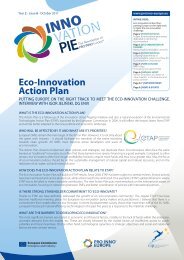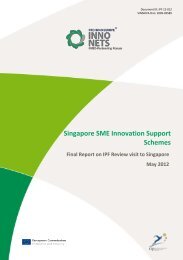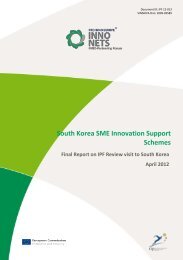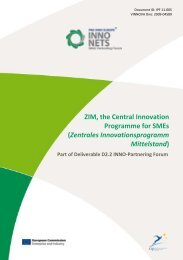Benchmarking National - PRO INNO Europe
Benchmarking National - PRO INNO Europe
Benchmarking National - PRO INNO Europe
Create successful ePaper yourself
Turn your PDF publications into a flip-book with our unique Google optimized e-Paper software.
36<br />
BENCHMARKING NATIONAL AND REGIONAL SUPPORT SERVICES FOR SMES IN THE FIELD OF INTELLECTUAL AND INDUSTRIAL <strong>PRO</strong>PERTY<br />
– together with high costs and limited resources – may constitute major barriers for<br />
patenting abroad. A recent study by Pitkethly showed similar results (see also<br />
section 5.4.1) (Pitkethly, 2007).<br />
Graph 4 shows the barriers to using IPR, as they are seen by the users questioned<br />
in the scope of this study. While there is a bias present with these SMEs (given that<br />
they actually make use of IPR support services, in contrast to other small and<br />
medium-sized companies which may not be even aware that such services exist),<br />
some points are interesting to note. First, in line with other study findings, costs<br />
and time issues are thought to be the major obstacle for a higher IPR usage. These<br />
aspects can be considered factors outside of the company. Inside factors are<br />
reported by the questioned SMEs to play, by comparison, a lesser but still not<br />
insignificant role in hindering the use of IPR. Only 16 % see lack of awareness of<br />
IPR to be a major barrier. Only 14 % see a lack of IPR expertise within the company<br />
to be a major barrier. Information on IP protection seems to be adequately<br />
available, with only 12 % seeing a lack of information as a major factor.<br />
Organisational issues are of even less concern.<br />
These results may be interpreted in several ways: Inside factors actually may not<br />
play such an important role after all (if compared to outside issues), and policy<br />
should, as a consequence, only concentrate on lowering the costs of the IPR system<br />
and making it more time-efficient. This interpretation might be true either because<br />
internal issues are, in general, not a high priority problem as concerns IPR (in which<br />
case the other study findings would have to be questioned), or because the service<br />
providers did a good job in transferring IPR know-how to their customers.<br />
There are several hints, though, suggesting why another scenario seems more<br />
plausible. First, SMEs rate the overall cost/benefit ratio to be, after the cost and<br />
time issues, the third largest barrier to using IPR. The implication is that the costs<br />
clearly outweigh the benefits. However, it could also point to a demand on the side<br />
of the SMEs for a better explanation of what the benefits of using IPR are, and if<br />
they are worth the costs. It is interesting to note in this regard that most respondents<br />
believed that the provision of information on “why and why not to patent” to<br />
constitute a much more important key factor for the quality of an IPR support<br />
service than the availability of material on “how to patent”. Given that many<br />
service providers complained about the lack of available quality staff while the<br />
competence of staff was rated to be the most important quality factor for a service,<br />
and also given that the skills required for an ideal IPR expert involve technical, legal<br />
AND business know-how, it is hardly conceivable that the majority of SMEs can<br />
marshal such staff in sufficient quality and quantity.<br />
Graph 4 Perceived barriers for using IPR, SME users of services which were<br />
selected as case studies for illustrating elements of good practice, in %<br />
80<br />
60<br />
40<br />
20<br />
0<br />
%<br />
31<br />
44<br />
Costs of IP<br />
protection<br />
30<br />
30<br />
Time to make<br />
IP protection work<br />
Source: User survey, n= 350<br />
28<br />
22<br />
unclear<br />
cost/benefit<br />
of IP protection<br />
24<br />
25 29 28<br />
16 14 12 12<br />
Awareness<br />
Lack of<br />
qualified<br />
personnel<br />
high relevance medium relevance<br />
Lack of info<br />
on IP protection<br />
IPR irrelevant<br />
in business context<br />
14<br />
6<br />
Organisational<br />
issues


